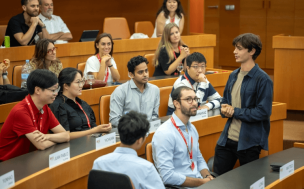Anne Pao Dunkley is a high-functioning professional at tech company Medallia in Silicon Valley. Once upon a time though, she was just your run-of-the-mill grad student who wanted to make the world a better place. She didn’t know how to dabble in social entrepreneurship but alas, in came an MBA from the University of Cape Town (UCT) Graduate School of Business (GSB).
“I had no entrepreneurial hopes until I came to Africa,” she says. “In the US, it can be difficult to spot opportunities in a saturated market, but in Africa markets are emerging, under developed, or non-existent.”
When picking an MBA, Anne didn’t want a traditional program, she “wanted to learn how pure profit can be transcended to include social impact.” The MBA she did at UCT GSB included time spent in the school’s social innovation lab, where student teams developed social innovation plans to address real developmental issues. This helped her enter the world of social entrepreneurship. She created Weaverlution, an online marketplace for social impact campaigns.
The Bertha Centre for Social Innovation and Entrepreneurship is a magnet for students at the University of Cape Town Graduate School of Business. It was established in 2011, and has built a reputation as being among the top five academic centers in the world for social impact.
While the Bertha Centre was an early innovator in this field, almost 50% of business schools, including other top business schools in South Africa such as the Wits Business School and the University of Stellenbosch Business School, now have a social impact program, initiative, or center.
It must also be noted that the majority of the students at these schools are millennials. They are the first generation to reach adulthood in the new millennium and while they have been criticized for being self-absorbed and social media obsessed, they also have a heightened sense of social purpose and responsibility.
According to a recent GMAC (Graduate Management Admission Council) study, MBA students are becoming less motivated by financial gain and more interested in creating social impact, gaining international exposure, and being respected by their peers.
The study, which was conducted in 15 countries and surveyed 5,900 MBA applicants, found that, globally, 27% believed that an MBA brought them professional respect, 14% were ‘global strivers’, and 10% were ‘balanced careerists’ interested in improving their professional standing. Additionally, 12% were designated as ‘impactful innovators’—candidates who were motivated primarily by making a positive impact on the world.
When looking at the study’s findings for Africa, the statistics were different. A much higher percentage of students fell into the category of impactful innovators. The UCT GSB’s own research has found a similar pattern; a higher percentage of applicants (around 25%) are interested in social impact and innovation and are looking for the skills to bring their ideas to life.
Business consultancy Deloitte found that millennials like to work at socially responsible companies. It claims that six-out-of-10 millennials require a sense of purpose at work. They don’t just want a job—they want to be engaged.
South African business schools appeal to these individuals because they recognize that to innovate and make an impact, it takes more than theory. Students need to learn how to implement innovative ideas—a process that requires a complex skill set, including humility and empathy.
Social impact researcher Dr. Warren Nilsson says for a social innovation enterprise to succeed it needs more than a good business plan. It must go beyond the philanthropic urge to help people. Instead of businesses seeing themselves as a tool or an instrument of change, they need to see themselves as part of a world that needs to change. He believes that without an authentic immersion in a local context, social innovation projects are doomed to fail.
Social change is complex and demands a different mindset, a willingness to collaborate, and to enter into partnerships. Students at business schools in South Africa are exposed to practical interactions and are able to collaborate with communities eager for real change.
This action learning is powerful. In the process of learning, students hone a skill set which includes heightened cultural awareness, sensitivity to diversity, empathy and resilience, and ways to bridge obstacles and arrive at workable resolutions. They increase their emotional intelligence (EQ), which is increasingly being seen as an indicator of career and personal success. Recruiters claim that organizations are increasingly hiring candidates with high EQ scores rather than those with high IQ scores.
As the global business landscape grows more nuanced and uncertain, it is the MBA candidates with high EQ and the drive to give back who will find themselves in a different league.

South Africa—a melting pot of inequality, social development and political instability—mirrors the complexities of the business world, as it constantly faces new uncertainties ranging from strained labor relations and contractual complexities, to technological challenges and cultural biases.
South African business schools are comfortable with being uncomfortable and perhaps this is the greatest lesson they teach their MBA students.
Amena Hayat is the career services manager at the University of Cape Town Graduate School of Business.
RECAPTHA :
53
2f
f3
e6







